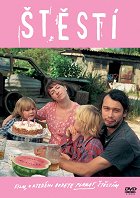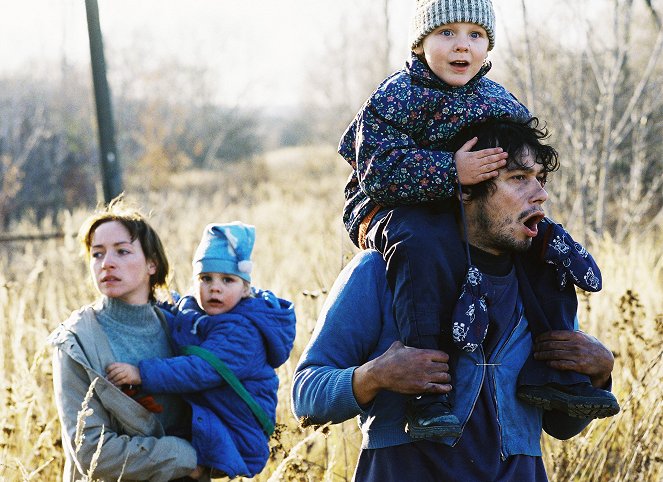Ohjaus:
Bohdan SlámaKäsikirjoitus:
Bohdan SlámaKuvaus:
Diviš MarekSävellys:
Leonid SoybelmanNäyttelijät:
Tatiana Dyková, Pavel Liška, Aňa Geislerová, Marek Daniel, Zuzana Kronerová, Simona Stašová, Bolek Polívka, Martin Huba, David Dolnik (lisää)Juonikuvaukset(1)
Monika, Tonik and Dasha grew up together in the same housing project on the outskirts of a small industrial city. Now the childhood friends are adults, each struggling with feelings of desire and loneliness, longing and failure. While her boyfriend pursues wealth and success in America, Monika waits, ever-hopeful that he will arrange for her to join him. Tonik has fled his stifling conservative family and lives with an eccentric aunt: together they struggle to defend her derelict farmhouse against the encroaching industrial development nearby. Dasha has two small children and a feckless married lover. Fragile, unpredictable, edging ever nearer to the brink of despair, she turns viciously on those closest to her. Though none would admit it, each craves something the other has and it's these unspoken longings which bind them in difficult, complex, passionate friendships. Dasha's mental state worsens dramatically, and she is committed to an asylum. Afraid that they will be taken into care, Monika looks after her kids. And when Tonik readily offers his support - and his home - she discovers his unspoken love for her. For Tonik himself it's a new beginning, a new chance. But, whatever he tells himself, this game of happy families is only that - a game. Monika is waiting to escape to the Land of Opportunity, the children are only on loan, and there's always another leak in the farmhouse... (jakelijan virallinen teksti)
(lisää)Videot (1)
Arvostelut (3)
Sláma's two previous films are close to my heart, perhaps because of their genuineness – from the unvarnished realistic setting, full of interesting people, often from the lower rungs of society, to the natural performances of everyone, from the pros to the non-actors. And although I've always had a problem with Pavel Liška's acting, I liked him very much here, also because his likeable character was well written. And that ending, it was unusual, unexpected.....and beautiful.
()
Bohdan Sláma is a difficult case - on one hand, he is original and can choose topics and look at them from such an angle that other Czech filmmakers are not capable of, but on the other, except for his last film Country Teacher, to which I gave a great review, his previous films seemed to be incomplete in terms of scriptwriting, and the same applies to this film. Sláma is unlucky in that he doesn't film about distant countries but about Czech society, and the situation with abandoned children, for example, simply doesn't work and cannot work the way he describes it. In addition, some of the decisions and emotional expressions of the main character do not seem believable. Otherwise, it is no wonder that foreign festival juries and critics are interested in his work. Sláma can describe love, for example, in a very unique way. He knows well that love contains compassion, sacrifice, and many other emotions. Some moments, like the reconciliation with the dying sister, are extremely touching and deserve two more stars on their own. Overall impression: 65%.
()
Bohdan Sláma did not excite me with his first film, and what is more, his raw documentary style really bored me. I therefore didn’t expect much from Something Like Happiness, and the beginning of the film took place precisely in Sláma’s seemingly dull and unmarked style, which gives an anti-illusory and non-plot impression. But unlike Wild Bees, after a while there is a high degree of identifying with the characters, and soon the passion for the inconspicuous and unforced, but all the more suggestive story. The study of the environment is perfect and surgically comprehensive, the inhospitable Most region creates a resonant backdrop for the tragic life of the main characters, which only intensifies the feelings of uprooting, abandonment and hopeless perspective. Sláma’s film is filled with excellent acting performances, where the Geislerová, Vilhelmová and Liška trio shine among the precisely cast characters. The latter finally threw away the stupid mask of an idiotic clown and created, in my opinion, one of the most impressive male types of post-revolutionary cinema. Something Like Happiness is a cold and bleak film, naturalistic and uncombed, complemented only by a minimalist Spanish motif, which appears as a refrain in the middle of an inhospitable story, from which happiness flows timidly over time, not stupidly sentimental, but real. Sláma was able to capture an unstylized life and, thanks to its extraordinary intensity, I rank his film among the best films made after 1989. Bohdan Sláma is maturing and it is a pleasure to watch it.
()



Mainos